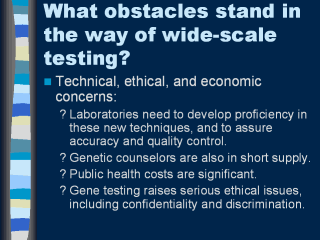|
|
|
|
front |1 |2 |3 |4 |5 |6 |7 |8 |9 |10 |11 |12 |13 |14 |15 |16 |17 |18 |19 |20 |21 |22 |23 |24 |25 |26 |27 |28 |29 |30 |31 |32 |33 |34 |35 |36 |37 |38 |39 |40 |Glossary |review |
 |
Having a blood test that accurately identifies a disease-causing mutation is
just the first step toward wide-scale testing. Before predictive gene tests
become generally available, specialists and society at large can come to grips
with major technical, ethical, and economic concerns. These issues need to be
addressed in carefully conducted research programs, and the answers are likely
to be several years in coming. Scientists are working to develop tests that are simple, cost-effective, and accurate. Tests need to be validated in broader populations, establishing that cancer susceptibility is caused by the gene mutation itself, not by other genetic or environmental factors shared by high-risk families. By comparing the cancer-causing genes of more and more people, researchers will be able to zero in on which of a gene's many mutations are significant and thus arrive at reasonably accurate predictions of disease risk. The logistics of delivering a test to the thousands or millions of people who might want it - even limiting it initially to those with a strong family history - is daunting. Demand could quickly overwhelm the current extremely limited facilities and personnel available for DNA testing. Laboratories need to develop proficiency in these new techniques, and to assure accuracy and quality control. Genetic counselors are also in short supply. People contemplating gene testing need information and guidance in order to make informed choices and weather the psychological stresses. The demand created by widespread testing would readily swamp the nation's approximately 1,200 genetic counselors, and it is likely that the task of education and counseling will fall to primary care physicians and nurses. Few primary health care providers, however, have training in this area. Public health costs are significant. In addition to the charges for the tests themselves, there are the expenses of counseling and of followup clinical screening and frequent monitoring. And prophylactic surgery costs many thousands of dollars. Finally, gene testing raises serious ethical issues, including confidentiality and discrimination. NIH is sponsoring studies of ethical issues generated by the genetics revolution, with the goal of supporting regulations and legislation to protect people from discrimination. Some states have passed legislation on health insurance discrimination and privacy. And research is under way to develop protocols to make sure that gene tests are never given without prior informed consent. |